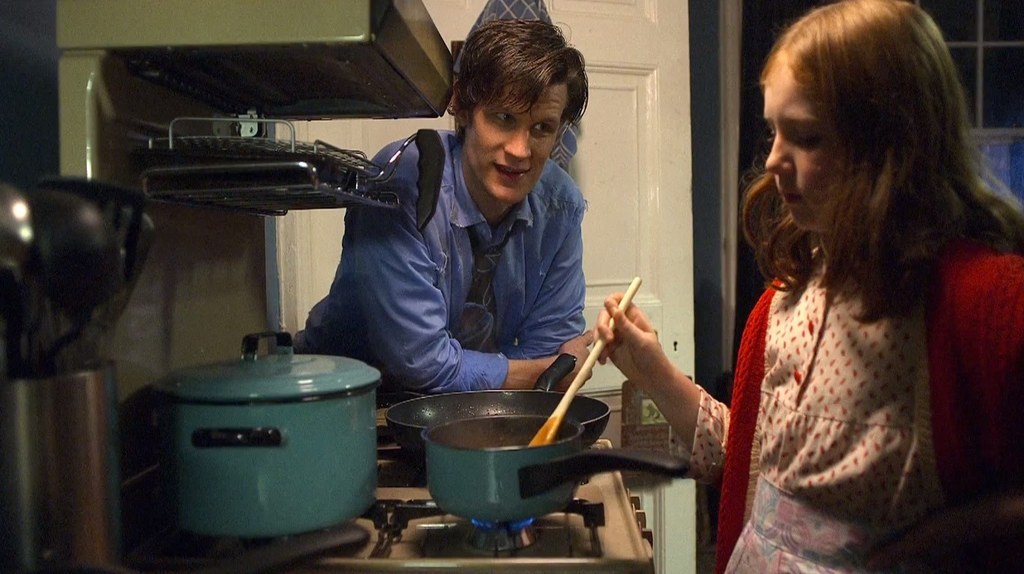
On Sunday, July 27, The Guardian posted a brief article in which new Doc Peter Capaldi listed some ways that the new season would be different from the most recent ones. No flirting, for one. For a few others:
Some situations are more sombre and I think there are more rooted dramatic scenes. Over the past two or three years, which I've loved, there has often been a breathless vigour; we still have that attack, but we have another level of drama, another tone. And the scenes are longer.
That part about longer scenes is what gets me excited.
Moffat has his detractors, but — just so we're clear — I'm a Moffat fan. I think he's written some of the best episodes in Nu Who's run, and there's a sizable consensus to back me up on this. You have the one-two punches of "The Empty Child" and "The Doctor Dances" from season one, and "Silence in the Library" and "Forest of the Dead" from season four. You also have the heartbreaking "The Girl in the Fireplace" from season two, and, from season three, the essential "Blink." These aren't just incredible Doctor Who episodes, or incredible examples of the television medium as an art form; they're incredible, period.
I would also argue strongly for the sixth season as one of the show's best, though now I'm swimming into less friendly waters. Season five is often cited as the pinnacle of Moffat's time as showrunner—and you won't catch me hating on it. Still, the labyrinthine mysteries of the sixth season, and the sense of impending doom in the wrap-around arc, give it an overarching weight, momentum, and sense of melancholy the fifth season didn't always have.
But here's where we have to get into Moffat's weaknesses, which even a staunch fan like myself has to be honest about.
In another article from The Guardian, Dan Martin notes that, "Steven Moffat's tenure as showrunner so far has been less emotional…" He's also been accused of drawing from a shallow well of worn-out tropes—which is true. Put "The Girl in the Fireplace" side by side with "The Eleventh Hour," Matt Smith's first full episode as the Doctor, and can see the same creative mind at work: The Doctor befriends a young girl and then is separated from her for what is, to him, only a few moments but for her is years. When they meet again, she's an adult who's spent most of her life daydreaming about the funny, mysterious man she met long ago.


But repetitive writing can only explain so much. The deeper problem with Moffat's run has been his pacing. His two-parters under Russell Davies carefully balanced action and mystery with quiet character moments. But Moffat and his writers are often more interested in cramming as much plot into a single episode as possible, to the point where each entry in season seven was supposed to feel like a standalone mini-blockbuster—and the season suffered as a result.
Capaldi's statement that season eight has longer scenes—and the fact that its finale will be a two-parter—makes me wonder if Moffat's turning a corner. Just consider the way Davies handled the biggest moments of his own run. Christopher Eccleston and David Tennant both got two-part send-offs, as did Billie Piper and Catherine Tate. Now, let's look at the way Moffat has handled similar moments in the past. The Ponds were shuffled out of the Doctor's life in an otherwise ordinary episode (season seven's "The Angels Take Manhattan"), while Matt Smith's send-off was limited to an hour-long Christmas special. And now there's news that Jenna-Louise Coleman's last adventure with the Doctor will also be a Christmas special. To me, there's clearly a difference in the amount of time Davies and Moffat have chosen to give these really big moments, with Davies devoting far more time to them.
But, if it's true that the scenes in season eight are longer, that could mean good things. Maybe this will be the most Davies-esque season since he gave the reins to Moffat.
Not that I want Moffat to stop being Moffat—remember, I'm a fan—but season seven was disappointing. Here's hoping longer scenes in season eight will translate into deeper character moments, a heightened sense of drama, and more emotion overall.

